

Steve Schlesing - from theater to church and beyond - a man of MANY talents, who HAD to buy a house because of Hauptwerk!!!
2016-04-04 - Featured ContributorsSome musicians specialize in one particular area. They stick to what they know, and do it well - hopefully!
Others do it all, but without any particular care or skill. They just do it, and hope it comes out OK... They have no style.
Well, our very own Steve Schlesing is a man of multiple interests and many talents! Whether it be in the theater or in church, a performance by Steve is always a superb one, combining all of the care, concern, and inventiveness that is so much a part of him. In short, Steve has talent - and it shows!
If you peruse the uploads on the Concert Hall, you are sure to find some excellent ones by Mr. Schlesing, but you'll have to look for him under his screen name - Keys61. Steve joined the Concert Hall WAY back in 2010, so he was one of our long-term members!
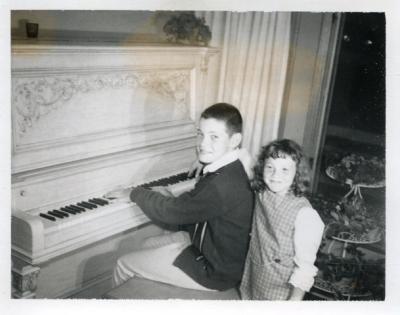
Steve at a young age, explaining to his sister, Donna, the value of "double touch" keyboards!
When I first became really interested in playing the organ, a man suggested that I take lessons with a man named Bob Hallett in Carlstadt, New Jersey. He taught from his home, which was located about 20 miles from where we lived. It was a little hard taking lessons, as I only had one of those push-button chord organs, but it was "decided" that I would study with him. I suppose you would have said that he was a "sort of" theater organist. I'm sure he had talent, but the music he played and taught was mostly music of the 30's and 40's, and for a young teenager, whose musical interests were split between the church and rock music, he just didn't appeal to me, and the lessons didn't last long. I suppose if I had only waited a few more years, the areas of rock & church would have SADLY become about the same.
I mention this organist, only because I did not appreciate the skills and talent that went into playing popular music at a high standard. I figured, "It's just an old, boring song, and he plays it in an old boring way!" I'm sure if I had the ability to listen, I would have heard a lot more there, but from that time forward, to me, being a "theater organist" meant that you were a guy who played old, boring music, because of one (or both) of two reasons: 1) that you, yourself, were old and boring, and 2) that you weren't "good enough to play real organ music," which to me, probably meant playing music by composers I had never heard of, and playing loudly.
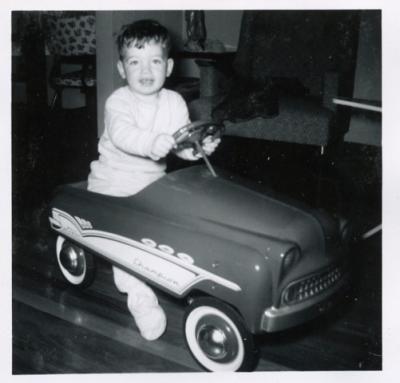
At this point, Steve had to decide whether to be a musician or to drive for Ferrari.
I used to listen to EVERY upload on the Concert Hall. I still try to do so, except for half-hour improvisations. Naturally, when a new upload appeared by Keys61, I would listen, even though I didn't think it would "interest" me. Anyway, what's so hard or special about playing some of those old songs?!?
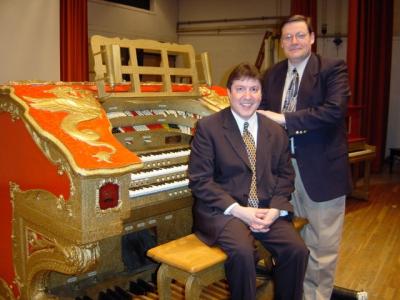
Steve with Pierre Fracalanza, after one of our Organ & Piano Duet shows. Flint Institute of Music. (Flint, MI….Before all the lead in the water!!)
Looking through Steve's impressive list of uploads, it appears that one of the first that I listened to was, In a Monastery Garden, by Albert W. Ketèlbey. You can find this here: https://www.contrebombarde.com/concerthall/music/6740
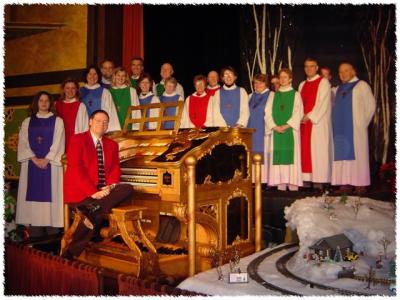
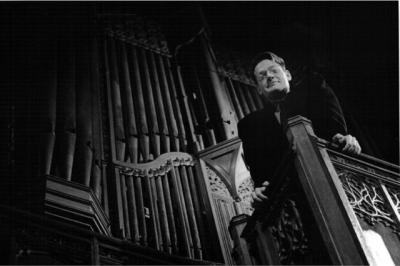
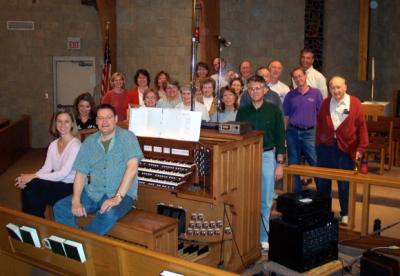

"Let me back up….. Joe Hardy, one of the creators of the Paramount series of organs for Hauptwerk convinced me (with additional prodding from Pierre Fracalanza) to be a BETA tester. Well once I had a taste of Hauptwerk, and the Paramount Organ Works Sample Sets there was no going back. Sampled tremulants make all the difference (to my ears) on making an electronic theatre organ or in Hauptwerk terms: the VTPO come to life. I started with the four speakers that were part of my Allen set-up, and of course that wasn’t enough. So………several speakers, amplifiers, subwoofers, etc and so-forth later I’ve moved into a small ranch-style home. Having common walls with neighbors doesn’t work when you want to play your instruments at all hours of the day and night! If you haven’t seen my Hauptwerk set-up you can get a video tour here:
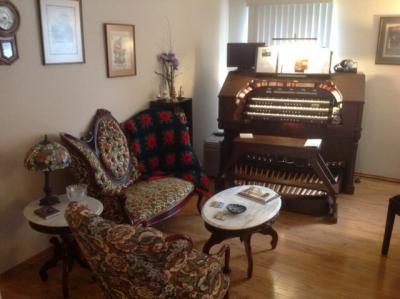
"I’m one of those strange ducks who has his toes in the theatre and the liturgical organ worlds. So now with Hauptwerk I enjoy playing any kind of music, on so many different types of organs in the comfort of my own home! Hauptwerk has made me a better organist. How? By enticing me to spend more time practicing, and by introducing me to organs I may never get to see, hear or play in person. ContreBombarde Concert Hall is also part of the equation. Having a place to upload performances makes me want to learn new music, try new registrations and play these uploads to the best of my ability….. it’s like putting yourself on display…warts and all! So I may record a song once and get a good take, or it may take me several (who am I kidding——sometimes as many as 25) takes to get it to a level I’d be willing to post on CB. Another great thing about CB is the congenial group of listeners, performers, and the kind folks that make comments. I’ve heard so many wonderful performances on the Concert Hall, and treasure each and every comment I have received on my posts."
"One of the projects I worked on for CB was a series of transcriptions of the music of Kètelbey. It took hours: locating the music, practicing, setting the registrations, and finally recording them. I really was inspired to do this series, by the sounds available on the Paramount Sample Sets, and by Michael’s Music Service, where many of the scores are available in elegant reprints. Thanks to the ContreBombarde Concert Hall’s playlist function, I can present them all together:
I"t would be nice to see a large Wurlitzer Theatre Organ recorded under ideal conditions. Because the theatre organs are high pressure instruments, it is so hard to get a clean sample due to wind leaks, and when the tremulants are turned on the problem is multiplied. The sample set producer has to clean up the samples to mitigate some of the “extraneous noise,” so there is always a bit of a trade off, in the finished product. The recording engineers have to balance the noise removal and how it effects the actual sound of the pipes. There are a few organs that have what is called “sub-flooring” where the chests and pipes are separated from the regulators and tremulants, thus reducing the wind noise by a large degree. So far, I do not believe any of these instruments have been recorded for a Hauptwerk sample set. Maybe in the near future! (That is a hope not a prediction!)"
"For myself, I would like to be able to obtain a Wurlitzer Pipe Organ console (replica or an original rebuilt) to control my Hauptwerk set-up. it’s a “pipe” dream now, but it is fun to imagine the possibilities. It would be so nice to have enough moveable stop tabs to control all the stops on the Paramount 450. Plus having real 2nd touch keyboards would be heaven for a theatre organist!"
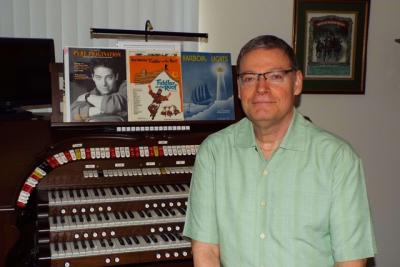
Comments